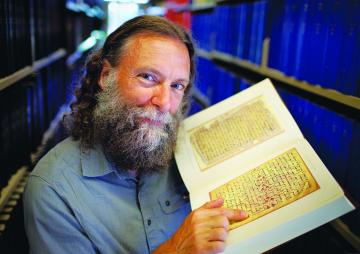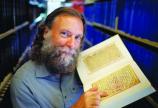Opening doors to Islam
- Peigi McGillivray

An invitation to speak at an international academic gathering is nothing new for historian Dr. Andrew Rippin, who this summer wound up his 10-year term as dean of humanities at the University of Victoria. But when the invitation comes from one of the most important centres of Islamic culture in the Middle East, and when only two other scholars from the Western world will be there, it shows how widely respected Rippin's research is around the globe.
Rippin was invited to the Bibliotheca Alexandrina in Alexandria, Egypt, to speak at a recent conference on Egyptian cultural heritage. "The library is a major centre of cultural and scientific excellence in the Islamic world," he says. "I was honoured to be invited as one of such a small number of Western scholars."
One of the world's pre-eminent authorities in the field of Islamic studies, Rippin focuses his research on the interpretation of the Qur'an—the central religious text of Islam— and its core influence on Islamic civilization.
"It's vitally important that we in the West find ways to understand a culture that is shared by one-fifth of the world's population—and one that has such an impact on global events," he says.
Rippin says his work is inspired by curiosity. "I want to know more about the Qur'an, where it came from, what role it has played in Islamic culture, and how it has been interpreted through history."
Rippin contrasts this curiosity-based research approach with the respect-based research of Muslim scholars, who study the Qur'an as the final revelation of God and engage in a different kind of critical analysis.
"The two methods and motivations are very different," says Rippin. "But what is important is that we are able to have an interchange of ideas and listen to one another, even if we continue to not see eye-to-eye. That's why my invitation to the Bibliotheca Alexandrina was so significant to me."
At the Bibliotheca Alexandrina, Rippin spoke to Muslim scholars from Egypt, Syria, Qatar, Lebanon, Kuwait, Saudi Arabia and Oman.
"While they remained skeptical about my motivation and approach, they listened to what I had to say. It felt like a door was opening, even if it may have had a lasting impact on just a few people."
Sharing his fascination with the world of Islam has informed Rippin's teaching and writing over his 30-year academic career. He teaches a fourth-year course on the foundations of Islam, and works with graduate students in the field of Islamic studies.
"There is a growing interest in Islamic studies in the West," says Rippin. "Here at UVic we've seen an increase in the number of students interested in Islamic history, culture, art and religion, and in the modern Middle East."
Rippin believes that building bridges between the Islamic world and the West is of vital importance. "Scholarship is a tool for creating greater understanding between our cultures," he says, "and that has never been more important than it is today."

